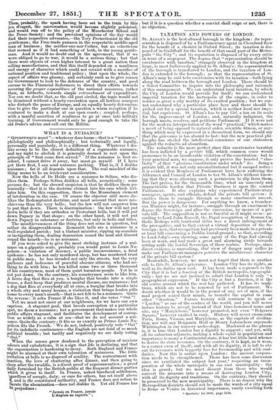WHAT IS A. NUISANCE
" QTrODCTINQUE nocet "—whatever does harm—that is a " nuisance," philologically and philosophically ; but technically and legally, personally and popularly, it is a different thing. Whatever I dis- like seems to be the closest definition of a cognizable nuisance, and my right to abolish it is generally deemed to rest upon the principle of "first come first served." If the nuisance is first re- sident, I cannot drive it away, but must go myself. If I have got there first, I can send nuisance packing. That is, if I dislike nuisance ; for it all depends upon that. The real mischief of the thing seems to be an irrelevant consideration.
to derive its state revenues. On the contrary, it is kept, as it were, odours and exhalations, it is a sign that life is declining, and that to a.corner even of. itself; and with all its dignity, it is loft to eke the organization is hardening to decay. Both England and France out its revenues this beggarly fees for freemanship and with eoal- , light be alarmed at their own toleration of nuisances. The little
duties. Now this is unfair upon London : the ancient corpora- \ irritation at bells is no disproof of senility. The contentment with \ inaction, the love of chattering after dinner, and then going to sleep after the twaddle, is a direct proof of superannuation ; a proof .
Now the bells of De Helde are a nuisance to Soltau, who dis- likes them. Perhaps Soltau dislikes all bells, acoustically ; some persons do ; but the shrewd suspicion is that he dislikes them po-
The mischievousness of the thing does not come in question, but rather its disagreeableness. Romanist bells are a nuisance in a well-regulated parish ; but a blatant minister, ripping up scandals or instigating them, dealing damnation round the land and discord round the hearth—he is no nuisance.
If you were asked to give the most striking instance of a nui- sance on a gigantic scale, probably you would point to Louis Na- poleon—a violation of decency, a public inconvenience, a fatal epidemic : he has not only muraered sleep, but has murdered trust in public men ; he has invaded not only the streets, but the very parlours and bedrooms of peaceful obscure citizens, who had no- thing to do with him ; he has killed some two or three thousand of his countrymen, most of them quiet harmless people. Yet he is not put down. On the contrary, his countrymen seem to like him. A fierce dog that flies at you, a burglar that breaks into a single house, a dust-heap that produces mortal disease, are nuisances ; but a dog that flies at everybody all at once, a burglar that breaks into a whole city and many houses, a visitation that brings leaden pills home to every man's mouth— that is not felt to be a nuisance. Quite the reverse : it asks France if she likes it, and she votes " Oui "! Yet we must not sneer at our neighbours, for we have our own caprices. A stagnant pool, that breeds corruption at a particular spot, we deem a nuisance ; but a government that makes our whole public affairs stagnant, and facilitates the development of corrup- tion as widely as a calm at sea—that we do not account a nui- sance. Quite the contrary ; it fits us as exactly as Prince Louis Na- poleon fits the French. We do not, indeed, positively vote " Oui" for its indefinite continuance—the English are not fond of so much political trouble ; but tacitly and negatively we are daily voting " Oui " ess of scruple, duty, or care for others, has set itself above and is the constituted authority, and France does not refuse to rate the abomination—does not dislike it. Yet old France has prej udiees : "Jatnais en France, jamais L'Anglais ae regnem" ;
but if it is a question whether a convict shall reign or net, there is no objection.


























 Previous page
Previous page